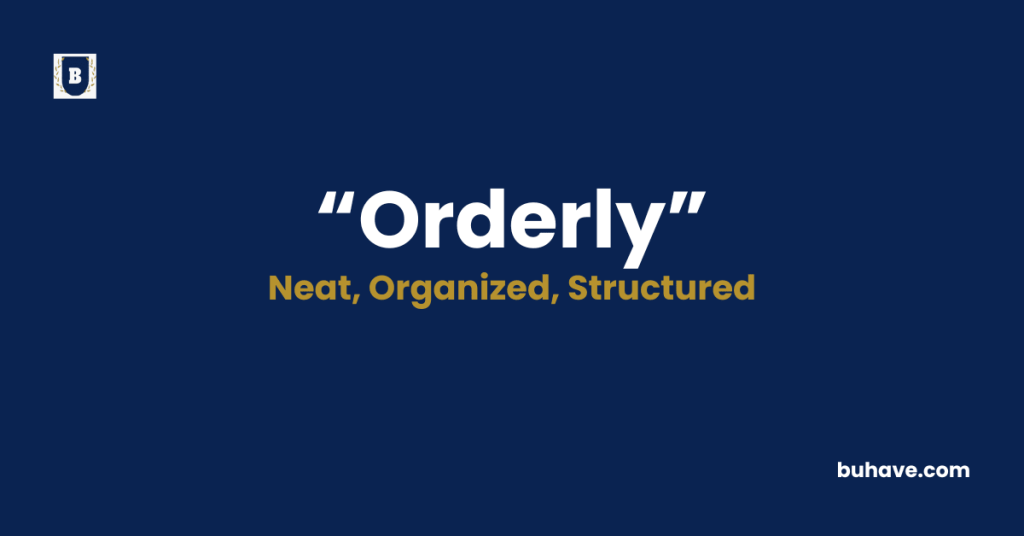The word ‘Orderly’ (Adjective) describes something or someone that is well-organized, neat, and follows a logical or structured pattern. In this guide, you’ll learn the full definition, synonyms, antonyms, etymology, and real-life examples of how to use ‘Orderly’ correctly in sentences.
Orderly Explained in Depth
A complete and detailed guide to the word Orderly including meaning, definition, examples, etymology, synonyms, and antonyms.
Meanings of Orderly
The word orderly refers to a state of organization, neatness, and methodical arrangement. It is often used to describe environments, behaviors, or systems where everything is in its proper place or follows a logical sequence. An orderly room is one where objects are stored neatly, with little or no clutter.
Definition
It often relates to physical environments, behavior, or processes that follow clear rules or patterns. An orderly space is clean and logically arranged; an orderly person is neat, controlled, and respectful of systems and discipline.
It involves thoughtful planning, intentional design, and ongoing maintenance of structure. This can apply to everything from a bookshelf sorted by genre, to a workflow process that moves through defined stages. It conveys a sense of control, predictability, and thoughtful design that contributes to clarity and peace of mind.
Etymology
The etymology of the word “orderly” is rooted in the concept of “order,” with the suffix “-ly” turning it into an adjective that describes a quality or characteristic. Here’s a breakdown of its linguistic journey:
- Root: “order” – From Middle English ordre, derived from Old French ordre, and from Latin ordo (genitive ordinis), meaning “row, rank, series, arrangement.” The Latin root refers to structure and proper arrangement in all aspects of life, from military ranks to moral conduct.
- Suffix: “-ly” – An English suffix used to form adjectives that express a characteristic or quality.
The word “order” itself has always been associated with structure, rank, and systematized arrangements, and the transformation into “orderly” brought a more descriptive and human-centered application of this concept. The word “orderly” first appeared in English in the 15th century, used to describe behaviors or appearances that reflected this sense of structure and proper arrangement. Over time.
Example Sentences
- The books were arranged in an orderly fashion on the shelf, sorted by color and size.
- She maintained an orderly routine that helped her stay focused and productive throughout the day.
- An orderly desk can greatly improve concentration and efficiency at work.
Orderly Synonyms
- Neat
- Organized
- Methodical
- Structured
- Systematic
- Disciplined
- Clean
- Regulated
- Controlled
- Tidy
Orderly Antonyms
- Chaotic
- Disorderly
- Messy
- Cluttered
- Random
- Unorganized
- Confused
- Disorganized
- Haphazard
- Untidy
FAQs about Orderly
Here are some frequently asked questions (FAQs) about the word “Orderly”
1. What does “orderly” mean in simple terms?
It means neat, well-organized, and arranged in a logical or clean way.
2. Can “orderly” be used to describe a person?
Yes, someone who is neat, disciplined, or behaves with self-control can be described as orderly.
3. What is an example of an “orderly process”?
A step-by-step hiring process, where each stage is clearly defined and followed, is an example of an orderly process.
4. Can “orderly” be used in a medical setting?
Yes, “orderly” can describe neat medical records or well-maintained hospital wards.

















